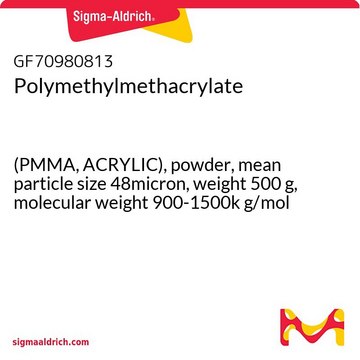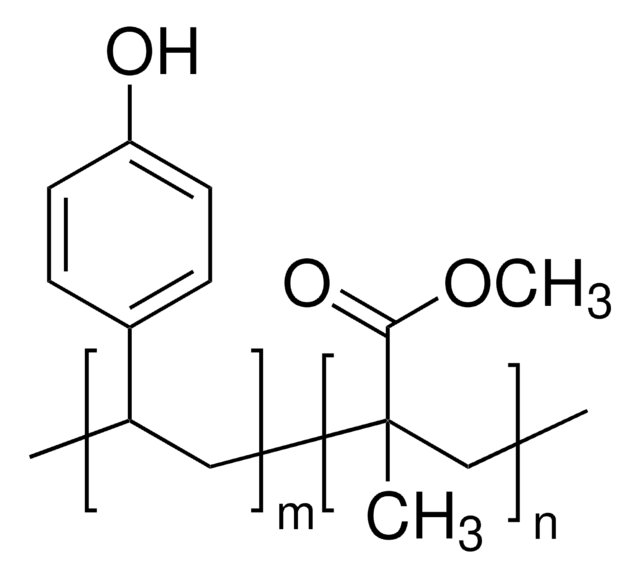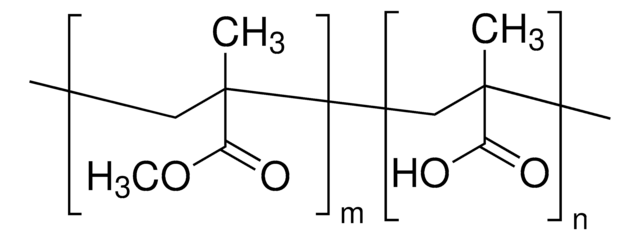03558
Poly(methyl methacrylate)
analytical standard, for GPC, 2,480,000
Synonym(s):
PMMA, Poly(methacrylic acid methyl ester)
Sign Into View Organizational & Contract Pricing
All Photos(1)
About This Item
Linear Formula:
[CH2C(CH3)(CO2CH3)]n
CAS Number:
MDL number:
UNSPSC Code:
41116107
PubChem Substance ID:
NACRES:
NA.24
Recommended Products
grade
analytical standard
for GPC
Quality Level
autoignition temp.
580 °F
shelf life
limited shelf life, expiry date on the label
mol wt
Mn ~2140000
Mp ~2740000
Mw ~2480000
solubility
H2O: insoluble
density
1.200 g/cm3
Mw/Mn
~1.16
storage temp.
2-8°C
InChI
1S/C5H9O2/c1-4(2)5(6)7-3/h1-3H3
InChI key
PMAMJWJDBDSDHV-UHFFFAOYSA-N
Looking for similar products? Visit Product Comparison Guide
General description
Poly(methyl methacrylate) is a material, which can be used in the fabrication of micro-fluid chips. It can also find applications in nano-transfer printing, since it can act like a macroscopic mediator in order to handle nanoscale building blocks.
Storage Class Code
11 - Combustible Solids
WGK
nwg
Personal Protective Equipment
dust mask type N95 (US), Eyeshields, Gloves
Choose from one of the most recent versions:
Already Own This Product?
Find documentation for the products that you have recently purchased in the Document Library.
Customers Also Viewed
Creation of nanostructures with poly (methyl methacrylate)-mediated nanotransfer printing
Jiao L, et al.
Journal of the American Chemical Society, 130, 12612-12613 (2008)
Development and spectral characterization of poly (methyl methacrylate)/hydroxyapatite composite for biomedical applications
Chen Y, et al.
Development and spectral characterization of poly (methyl methacrylate)/hydroxyapatite composite for biomedical applications, 18(1), 41-45 (2004)
Pleural infection 55 years after plombage for pulmonary tuberculosis.
Qian-kun Chen et al.
Asian cardiovascular & thoracic annals, 21(1), 100-100 (2013-02-23)
Gursukhman S Sidhu et al.
Journal of neurosurgery. Spine, 19(1), 61-70 (2013-05-07)
The authors endeavor to highlight the surgical management of severe neurological deficit resulting from cement leakage after percutaneous vertebroplasty and to systematically review the literature on the management of this complication. A patient presented after a vertebroplasty procedure for traumatic
S A Bini et al.
The bone & joint journal, 95-B(3), 367-370 (2013-03-02)
We evaluated the impact of pre-coating the tibial component with polymethylmethacrylate (PMMA) on implant survival in a cohort of 16 548 primary NexGen total knee replacements (TKRs) in 14 113 patients. In 13 835 TKRs a pre-coated tray was used
Our team of scientists has experience in all areas of research including Life Science, Material Science, Chemical Synthesis, Chromatography, Analytical and many others.
Contact Technical Service


